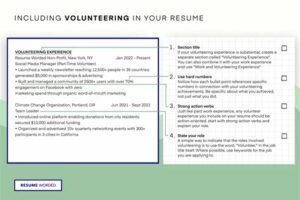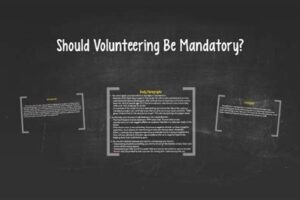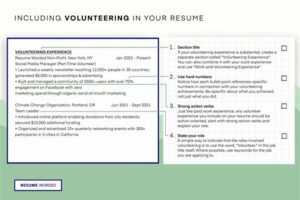Table of Contents
Learn how to effectively showcase your volunteer work on your resume with our comprehensive guide. Understand the importance of highlighting your skills and experiences gained through volunteering and discover the best ways to incorporate them into your resume to impress potential employers.
Are you looking to make your resume stand out from the crowd? One effective way to do so is by highlighting your volunteer work. Not only does volunteer work showcase your commitment to giving back to the community, but it also demonstrates valuable skills and experiences that are highly sought after by employers. By strategically incorporating your volunteer work into your resume, you can effectively showcase your dedication, teamwork, and leadership abilities. In this article, we will explore how to put volunteer work on your resume in a way that catches the reader’s attention and presents you as a well-rounded and socially conscious professional.
Introduction
In today’s competitive job market, having volunteer work on your resume can give you a significant advantage. Not only does it demonstrate your commitment to making a positive impact in your community, but it also showcases valuable skills and experiences that employers value. In this article, we will guide you through the process of effectively putting volunteer work on your resume.
Identify Relevant Volunteer Experiences
The first step in incorporating volunteer work into your resume is to identify the most relevant experiences. Consider the skills and qualities required for the job you are applying for and select volunteer positions that align with those requirements. For example, if you are applying for a marketing role, volunteering for a nonprofit organization’s social media campaign would be highly relevant.
Include a Dedicated Volunteer Experience Section
To highlight your volunteer work, create a separate section on your resume specifically dedicated to this experience. This allows hiring managers to easily locate and evaluate your volunteer experiences alongside your professional work history.
Provide Detailed Descriptions
When listing your volunteer experiences, provide detailed descriptions of your roles and responsibilities. Explain the tasks you performed, the skills you utilized or developed, and the impact you made. Quantify your achievements whenever possible. For example, instead of saying Assisted with event planning, say Planned and executed a fundraising event that raised $10,000 for the organization.
Emphasize Transferable Skills
Volunteer work often provides an opportunity to develop transferable skills that are applicable to various professional settings. Identify the skills you acquired during your volunteer experiences, such as leadership, teamwork, communication, problem-solving, and project management. Highlight these skills in your resume, demonstrating how they can benefit the prospective employer.
Highlight Relevant Achievements
If you have received any awards, recognition, or achieved significant milestones during your volunteer work, be sure to include them on your resume. These achievements demonstrate your dedication, commitment, and ability to make a meaningful impact.
Showcase Leadership Positions
If you held any leadership positions within volunteer organizations, highlight them on your resume. Leadership roles indicate your ability to manage and inspire others, as well as your potential for taking on greater responsibilities in a professional setting.
Include Professional Development
Volunteer work often offers opportunities for professional growth and development. If you have attended any workshops, training sessions, or gained certifications through your volunteer experiences, mention them on your resume. This shows your commitment to continuous learning and improvement.
Mention Relevant Volunteer Work in Cover Letter
In addition to including volunteer work on your resume, it is also beneficial to mention relevant experiences in your cover letter. Use this opportunity to elaborate on how your volunteer work has shaped your professional skills and values, and how it aligns with the position you are applying for.
Be Prepared to Discuss Your Volunteer Work in Interviews
Having volunteer work on your resume may catch the attention of interviewers, who may ask you questions about your experiences during the interview. Be prepared to discuss specific projects, challenges you encountered, and the impact you made through your volunteer work. Use these discussions to showcase your passion, dedication, and ability to apply your skills in real-world situations.
Conclusion
Volunteer work can be a valuable addition to your resume, demonstrating your commitment to making a positive impact and showcasing relevant skills. By following the steps outlined in this article, you can effectively incorporate your volunteer experiences into your resume and increase your chances of landing your dream job.
How to Put Volunteer Work on Your Resume
Volunteering is a valuable experience that not only allows you to give back to the community but also helps you develop essential skills that can enhance your professional profile. When it comes to showcasing your volunteer work on your resume, it’s important to do so effectively in order to highlight your commitment and the transferable skills you gained. By following these guidelines, you can effectively incorporate your volunteer experience into your resume and impress potential employers.
1. Include a dedicated Volunteer Experience section
Showcase your volunteer work prominently by creating a separate section on your resume. This allows potential employers to easily identify and appreciate your commitment to giving back to the community. By having a dedicated section, you demonstrate that your volunteer work is a significant aspect of your professional journey.
2. Provide a clear and concise description of your volunteer roles
When listing your volunteer experience, provide a brief overview of the organization you volunteered for, the duration of your involvement, and the specific tasks and responsibilities you undertook. This helps employers understand the context and scope of your volunteer work. Additionally, use action verbs to describe your achievements and contributions, making your experience more impactful.
3. Highlight transferable skills gained through volunteering
Emphasize the skills you acquired during your volunteer work that are applicable to the job you’re applying for. Whether it’s leadership, communication, teamwork, or problem-solving skills, showcasing these abilities can strengthen your resume and demonstrate your adaptability. Use specific examples to illustrate how your volunteer experience has equipped you with these skills.
4. Quantify your impact
Whenever possible, quantify the impact of your volunteer work by mentioning the number of hours you dedicated or the number of people you positively influenced. This showcases your commitment and allows employers to assess the scale and significance of your contributions. For example, you could mention that you organized a fundraising event that raised $5,000 for a local charity or that you mentored five at-risk youth.
5. Incorporate volunteer work into relevant professional experiences
If your volunteer work closely aligns with your professional experience or the job you’re applying for, consider integrating it into your work history section. This demonstrates a seamless connection between your volunteer and professional roles, emphasizing your multifaceted capabilities. For example, if you volunteered as a graphic designer for a nonprofit organization, include it as part of your work experience if you are applying for a design-related position.
6. Tailor your volunteer experiences to align with the job requirements
Just like any other section of your resume, customize your volunteer experiences to match the skills and qualities sought by the employer. Highlight the aspects of your volunteer work that directly relate to the position you’re applying for, making it more relevant and impactful. This shows that you understand the needs of the employer and can effectively contribute to their objectives.
7. Include any certifications or training related to your volunteer work
If you’ve received any relevant certifications or training during your volunteer experience, be sure to list them on your resume. This demonstrates your commitment to learning and professional growth, enhancing your overall profile. For example, if you obtained a certification in first aid while volunteering at a medical clinic, include it as part of your qualifications.
8. Provide references or testimonials from your volunteer organizations
If possible, consider including references or testimonials from the organizations you volunteered for. This adds credibility to your volunteer work and provides potential employers with additional perspectives on your performance and character. It shows that you have made a positive impact and have formed meaningful relationships within the organizations you have worked with.
By following these guidelines, you can effectively highlight your volunteer work on your resume and demonstrate to potential employers the valuable skills and experiences you gained through your commitment to giving back to the community. Remember to tailor your volunteer experiences to align with the job requirements and present yourself as a well-rounded candidate with a strong dedication to both personal and professional growth.
In today’s competitive job market, it is essential to make your resume stand out from the rest. One way to achieve this is by highlighting your volunteer work experience. Including volunteer work on your resume not only demonstrates your commitment to making a positive impact on society, but it also showcases valuable skills and qualities that can be transferable to the professional world.
When adding volunteer work to your resume, it is important to follow these guidelines:
- Include a separate section: Create a dedicated section for volunteer work on your resume. This ensures that your volunteer experience gets the attention it deserves and does not get overshadowed by other sections.
- Provide a clear title: Use a clear and concise title for your volunteer work section, such as Volunteer Experience or Community Involvement. This helps hiring managers quickly identify and understand this part of your resume.
- Include relevant details: For each volunteer position you list, provide the organization’s name, your role or responsibilities, and the dates you were involved. If you held any leadership or specialized roles, be sure to highlight them as well.
- Showcase transferable skills: Highlight the skills you gained or enhanced through your volunteer work. These may include communication, teamwork, leadership, problem-solving, or organizational skills. Use specific examples or achievements to demonstrate how you applied these skills in a real-world setting.
- Quantify your impact: Whenever possible, quantify the impact of your volunteer work. For instance, mention the number of people you helped, the amount of money raised, or the success of a particular project. This adds credibility to your experience and shows your ability to achieve tangible results.
- Connect volunteer work to job requirements: Tailor your volunteer experience to align with the job you are applying for. Identify specific skills or experiences gained through volunteering that directly relate to the requirements of the position. This helps employers understand how your volunteer work is relevant to their organization.
- Highlight consistency and commitment: If you have been involved with a particular organization or cause for an extended period, emphasize your long-term commitment. This demonstrates your dedication, reliability, and ability to follow through on commitments.
- Proofread and format: Just like any other section of your resume, ensure that your volunteer work section is free from grammatical errors and typos. Use a consistent format and professional language throughout the document.
By incorporating your volunteer work into your resume using these guidelines, you can effectively demonstrate your passion, skills, and dedication to making a positive impact. This will not only impress potential employers but also increase your chances of landing the job you desire.
Thank you for visiting our blog and taking the time to read our article on how to put volunteer work on your resume. We understand that finding ways to showcase your volunteer experience can be a valuable asset in today’s competitive job market. By incorporating your volunteer work into your resume, you not only demonstrate your commitment to making a difference in your community but also highlight the transferable skills you have gained through these experiences.
Firstly, it is important to create a dedicated section on your resume specifically for your volunteer work. This will ensure that your potential employer can easily identify and appreciate the time and effort you have invested in giving back to society. When listing your volunteer experience, make sure to include the organization you volunteered for, the duration of your involvement, and a brief description of your responsibilities and accomplishments. Use action verbs such as organized, coordinated, or facilitated to effectively communicate your contributions and the impact you made.
In addition to highlighting your volunteer work in a separate section, you can also integrate it throughout your resume by relating it to your professional experience. For instance, if you have held leadership positions or managed projects during your volunteer work, this can demonstrate your ability to take initiative, work collaboratively, and effectively manage time and resources. By drawing connections between your volunteer experience and your desired job, you can effectively showcase your skills and qualities that are relevant to the position you are applying for.
In conclusion, incorporating your volunteer work into your resume can greatly enhance your chances of standing out to potential employers. By creating a dedicated section for your volunteer experience and relating it to your professional skills and accomplishments, you can effectively demonstrate your commitment to making a difference and showcase the valuable transferable skills you have gained. Remember to use action verbs and be concise yet informative when describing your volunteer work. Good luck with your job search, and we hope this article has provided you with valuable insights on how to put volunteer work on your resume!
.
People also ask about how to put volunteer work on your resume:
Should I include volunteer work on my resume?
Answer: Yes, including volunteer work on your resume can be beneficial. It showcases your commitment to community involvement and can demonstrate skills and experiences that are relevant to the position you’re applying for.
Where should I list volunteer work on my resume?
Answer: You can include volunteer work in a separate section titled Volunteer Experience or integrate it into relevant sections such as Work Experience or Skills. Choose the option that best highlights the value of your volunteer work for the specific job you’re seeking.
How do I describe volunteer work on my resume?
Answer: When describing your volunteer work, focus on the skills and accomplishments gained during your service. Use action verbs and quantify your achievements whenever possible. Highlight any leadership roles, projects completed, funds raised, or positive impacts made.
What if I don’t have much volunteer experience?
Answer: If you have limited volunteer experience, emphasize transferable skills gained from other activities or part-time jobs. Include any relevant coursework, internships, or extracurricular involvements that demonstrate your commitment, teamwork, or organizational abilities.
Can I use volunteer work to fill employment gaps?
Answer: Absolutely! Volunteer work is an excellent way to address employment gaps and show your dedication to personal growth. Treat your volunteer experience as legitimate work, showcasing the skills and responsibilities you acquired during that time.
Should I provide references for my volunteer work?
Answer: It’s not necessary to provide references for volunteer work unless specifically requested. However, if you worked closely with a supervisor or colleague who can vouch for your skills and dedication, it may be beneficial to include their contact information in a separate References section.
How do I tailor my volunteer work to specific job applications?
Answer: Review the job description and identify relevant skills and experiences sought by the employer. Then, select and emphasize the volunteer work that aligns with those requirements. Highlight how your volunteer experiences have developed your abilities in areas needed for the position.






